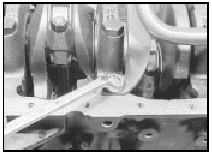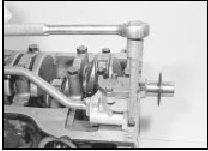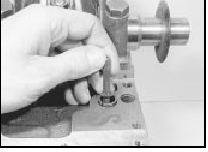Oil pump - removal and refitting
Removal
1 Remove the sump.
2 Unscrew the bolt securing the pick-up tube and strainer to the cylinder block (see illustration).

30.2 Unscrewing the oil pick-up tube securing bolt
3 Using a suitable splined socket, unscrew the two securing bolts and withdraw the oil pump and strainer (see illustration).

30.3 Unscrewing an oil pump securing bolt
4 If desired, the hexagon-shaped driveshaft can be withdrawn, but note which way round it is fitted (see illustration).

30.4 Withdrawing the oil pump driveshaft
The driveshaft
engages with the lower end of the distributor
driveshaft.
5 Thoroughly clean the mating faces of the oil pump and cylinder block.
Refitting
6 Commence refitting by inserting the oil
pump driveshaft into the cylinder block in its
previously noted position.
7 Prime the pump by injecting oil into it and turning it by hand.
8 Fit the pump, insert the securing bolts, and tighten them to the specified torque.
9 Fit the pick-up tube securing bolt and tighten it.
10 Refit the sump.
See also:
Engine oil
Checking the engine oil
Refer to the scheduled maintenance guide for the appropriate intervals
for checking the engine oil.
1. Make sure the vehicle is on level ground.
2. Turn the engine off an ...
Rear parcel shelf - removal and refitting
Removal
1 Open the tailgate fully and disengage the
parcel shelf lifting strap loops from the tailgate
retaining knobs.
2 Lift out the parcel shelf pivot pins from their
notches in the support br ...
Ignition switch - removal and refitting
Pre-1986 models
Removal
1 Disconnect the battery, undo the screws
and remove the steering column lower
shroud.
2 Insert the ignition key into the lock and turn
it to position I.
3 Using a flat- ...
